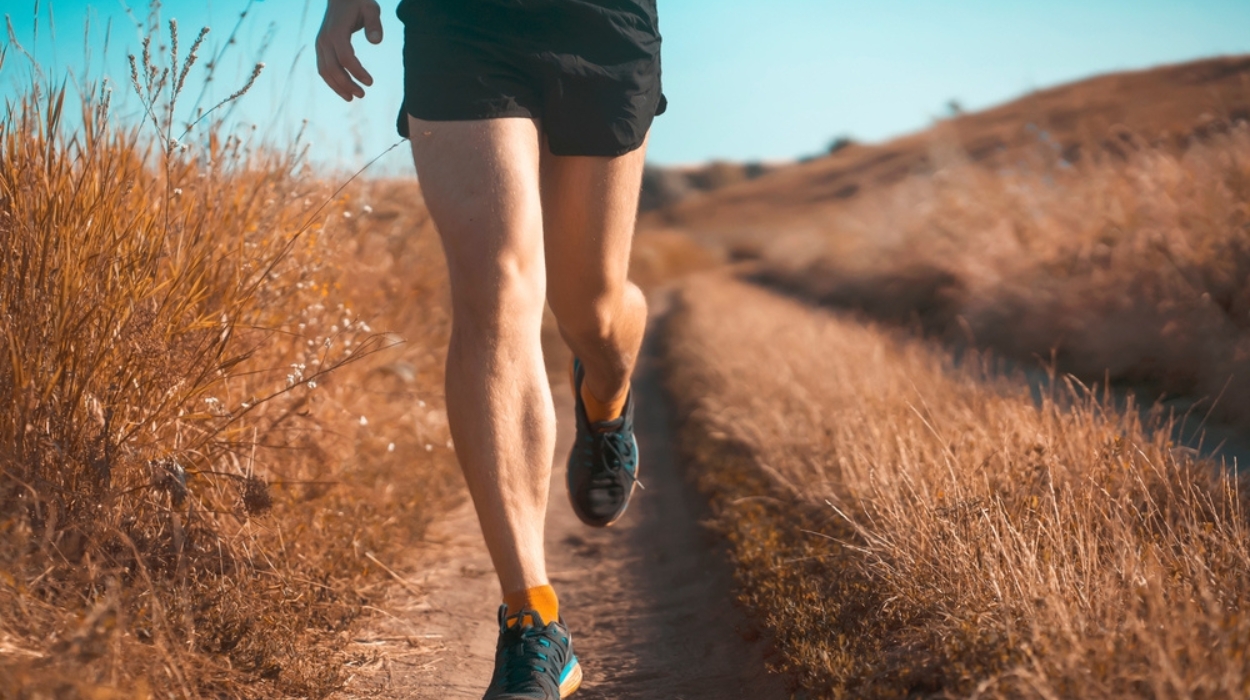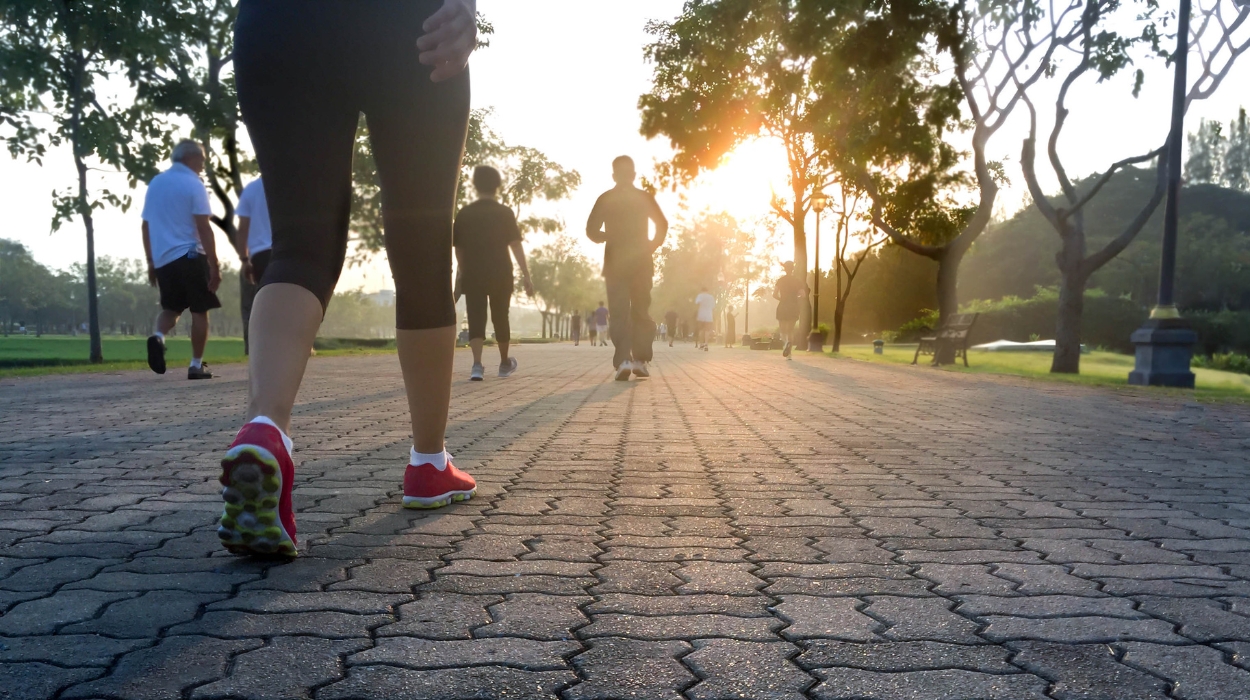
Running offers an easy go-to for any fitness level. There’s no gym membership required. All you need is a good pair of running shoes and maybe a bit of knowledge regarding proper running form.
However, one of the biggest debates in the running community is whether running in the morning or evening is best. A morning person may argue that a morning jog is the perfect start to the day. For those who have difficulty falling asleep, this might be a whole other story.
Inevitably, sleep is important. Thus, cutting sleep down may not be best for accomplishing your goals.
But should you try to adjust? What are the benefits of running in the morning? Below, we explore the advantages of a morning workout and how morning runners might have a leg up.
Eight Benefits Of Running In The Morning
Should you run in the morning? Here are eight benefits why you should consider it:
- Increases adherence.
- Milder weather.
- Prepare your body for race day.
- Enhances mental focus.
- Improves sleep.
- Reduces blood pressure.
- Improves mood.
- Enhances weight loss.
Eight Benefits Of Early Morning Runs

When it comes to running vs biking, running reigns supreme due to its lack of equipment required. With such a low barrier to entry, it makes morning exercise easy.
So, let’s explore the many benefits of running every morning. Should you revamp your running schedule? And why?
Increases Adherence
For race preparation, a consistent morning routine ensures you stay on track toward your goals. You get your morning runs done before the day even starts, leaving little room for excuses.
As the day drags on, it’s easy for us to feel weighed down by the pressures and stressors of life. By the end of the work day, lounging on the couch might sound much better compared to fresh air outside. But the morning leaves little time to think about it.
Research indicates that exercising at a consistent time,[1] especially in the morning, leads to greater adherence. Researchers hypothesized that this may be because it’s less likely other events are planned for the morning versus the evening. In turn, this creates fewer schedule conflicts.
And this also applies to other exercise outside of running. For instance, if you’re planning dumbbell leg workouts or core workouts, these may also be best completed in the morning. Simply put, you’re more likely to do it if you get it out of the way first.
May Provide Milder Weather
Morning runs may offer the perfect weather conditions. With the sun barely in the sky, you’re less likely to feel beaten down by the heat. This may prevent heat exhaustion or stroke, as well as enhance your performance.
Many runners say this is one of the main reasons they get up and go. The afternoon hours can provide high UV ratings and increased heat, making them less ideal. In other words, you also might reduce your risk of sunburn, too.
Prepares Your Body For Race Day
The importance of jogging in the morning may depend on your goals. If you intend on participating in a race, it’s likely the event will take place in the morning. This is frequently to avoid the potential risks, like heat exhaustion, that are more likely later in the day.
A morning run can, thus, prepare your body for race conditions. For example, a consistent schedule may help regulate bowel movements,[2] training your body to go before your jog first thing. In turn, this could also alleviate unwanted digestive discomforts on race day.
Yet, morning run benefits extend beyond consistency and race prep. There are also plenty of health benefits associated with morning workouts.
Enhances Mental Focus
A major benefit of morning jogging is that the mental benefits cascade throughout the rest of your day. For example, research suggests that you experience greater attention, problem-solving, decision-making, executive functioning, and cognitive flexibility two hours post-exercise.[3]
Exercise combined with caffeine is further shown to enhance sustained focus[4] while reducing fatigue. Additionally, a study conducted on teens showed they performed academically better and faster with exercise and breakfast in the morning.[5]
In other words, a morning workout, such as a morning run, can offer cognitive benefits. In turn, this can impact academic and work performance, helping you level up.
Improves Sleep Quality
The mental benefits of running in the morning also spill over into the night. It’s thought early morning exercise could improve insomnia,[6] which is difficulty sleeping.
In a 2017 study, researchers explored morning exercise and its impact on older adults with insomnia.[7] They found that morning exercise improved sleep quality, specifically in the later half of the night. It also led to fewer awakenings during the night.
In contrast, exercise ending less than one hour before bed may hinder sleep onset[8] and total sleep time. However, this same review stated that there was also not enough evidence to say that evening exercise holistically disrupted sleep.
A recent study further stated that exercise[9] should be promoted at any time of day for its overall benefits. Thus, more research may be needed to conclude specifics regarding exercise timing and sleep quality.
Reduces Blood Pressure
When compared to prolonged sitting, morning exercise was found to lower blood pressure.[10] This study was specifically conducted in older, obese adults.
As blood pressure is a marker of cardiovascular disease,[11] running every morning could lower your risk of a heart attack or stroke. This can improve your heart health and overall cardiovascular fitness, decreasing the risk of early death.
Additionally, the potential sleep benefits discussed above could also have a positive impact on blood pressure. Poor sleep patterns are linked with increased blood pressure.[12] This could be particularly beneficial for individuals who may have genetic predispositions to heart disease.
Improves Mood

Many individuals use exercise as a stress-coping mechanism. And you’ll hear many runners talk about the runner’s high. So, is this real?
Well, animal studies show that endorphins[13] may be responsible for this feeling. And that this is particularly prominent after running. If you struggle with mental health, such as anxiety, a jog might help to put you in a good mood.
It can boost your mood, helping you start your day on the right foot. On top of this, you might just see the sunrise, which can add a moment of awe to your day.
Enhances Weight Loss
Inevitably, running can help burn calories. For weight reduction to happen, a calorie deficit must occur. However, it’s important to note that sustainable loss requires a holistic approach, including diet changes.
Yet, aerobic exercise in the morning hours may have some advantages for fat loss. A study with active male adult participants showed fat oxidation increased[14] post-fasted morning exercise. Fat oxidation refers to the body breaking down fat, which may decrease overall body fat.
Running may also drive increases in muscle mass. If you’re wondering does running make your butt bigger, you’re in luck. Running may contribute to more muscle mass in the entire lower body.
This can further contribute to your weight reduction efforts. Research shows how low muscle mass may contribute to increased body fat,[15] suggesting more might be a good thing. And running can help you get there.
This may then lead to the question: How long should I run on the treadmill for fat loss? This will largely depend on your specific goals and current body weight. Again, weight reduction efforts should incorporate a holistic approach, including diet and other lifestyle changes.
The Advantage Of Running In The Morning Vs. Evening
There are countless advantages to running in the early hours versus later on. These include:
- Better preparation for an upcoming race, which is more likely to be in the morning.
- Improved adherence to your running routine.
- Enhanced focus for the day’s tasks ahead.
- Not having any evening workouts hanging over your head.
- Watching the sunrise, which puts you in a better mood.
The exact advantages may depend on your goals and needs. However, there’s no denying that running earlier leaves fewer excuses or opportunities to bail later.
Yet, many enjoy running in the evenings. This can be particularly beneficial if you’re not a morning person but desire lower temperatures and less sun.
Either way, the most important part is ensuring you get enough physical activity. Thus, find something you love and stick with it. If that’s morning or evening runs, keep at it.
Potential Risks And Precautions
While there are many benefits of running in the morning, there are a few precautions and risks. Some things to keep in mind include:
Wearing Proper Gear
Depending on where you live, it may be dark during your morning jog. This can leave you vulnerable to cars who may not be able to see you as well. Thus, it’s best to wear plenty of reflective gear.
Consider a reflective vest, a flashing light, and more to ensure you’re as visible as you can be. Avoid wearing dark colors. Instead, opt for bright-colored clothing. The more visible you are, the better.
On top of this, always wear proper running shoes. Inadequate footwear can increase your risk of injury and pain.
Eating Beforehand
This can be tricky with running first thing in the morning. It also may depend on the individual and their food tolerances. Generally, however, eating quick and easy-digesting carbs may provide the energy you need.
This may take some experimentation, but it’s well worth it to reduce fatigue. Some individuals may do well with a banana right before and a bigger breakfast after. Meanwhile, others may find other options to sit in their stomach better.
Again, experiment. In some cases, fasting may also be considered. In either case, always ensure you drink plenty of water before, during, and after your run.
Getting Enough Sleep
Cutting your sleep short is never a good idea. If you’re not a morning person but are interested in getting up early, slowly adjust your sleep schedule. Go to bed slightly earlier and get up slightly earlier.
It may further help to have your clothes and runners laid out the night before. This will leave little room for thinking and allow you to get up and go with greater ease.
Taking Care Of Your Joints
You might wonder: Is running bad for your knees? While running is often considered high-impact, some evidence suggests it may not cause knee osteoarthritis.[16] Instead, it might help in the short term.
Yet, this doesn’t mean that you should push through any pain that arises. If you have joint pain when running, it might be best to consider a low-impact option. For example, biking or using an elliptical could provide similar cardio while not causing pain.
Lastly, if you experience knee or hip pain, it’s a good idea to consult with a professional. Physical therapists or personal trainers can provide appropriate leg workouts specific to you and your situation.
Conclusion
The benefits of running in the morning may outshine running later in the day. Consider what is best for your lifestyle and goals. Overall, any form of physical activity is beneficial for health and well-being and trumps sedentary behavior.
Choose a type of exercise you enjoy and time it for when it best fits into your existing routine. If that means running in the morning, then stick with that.
This could start your day off on the right foot, setting the tone for the rest of your day. Plus, the benefits above speak for themselves. Try it, and see if it’s right for you.
Frequently Asked Questions
Yes, running in the morning can increase adherence to exercise. It can also set the tone for the rest of your day, enhancing cognitive function and mood.
This depends on the individual and the type of run performed. You may want to experiment with different foods beforehand to uncover what works best for you.
Yes, if it suits your schedule, running as soon as you wake up can have many advantages. Most importantly, it can help you get your workout done first thing and have fewer excuses to skip it.
Running in the morning may burn fat. However, the research shows that this happens in a fasted state, which may or may not be appropriate for you.
Resources
- Schumacher, L.M., J Graham Thomas, Raynor, H.A., Rhodes, R.E. and Bond, D.S. (2020). Consistent Morning Exercise May Be Beneficial for Individuals With Obesity. Exercise and Sport Sciences Reviews, [online] 48(4), pp.201–208. doi:https://doi.org/10.1249/jes.0000000000000226.
- Henri Duboc, Coffin, B. and Laurent Siproudhis (2020). Disruption of Circadian Rhythms and Gut Motility. Journal of Clinical Gastroenterology, [online] 54(5), pp.405–414. doi:https://doi.org/10.1097/mcg.0000000000001333.
- Basso, J.C. and Suzuki, W.A. (2017). The Effects of Acute Exercise on Mood, Cognition, Neurophysiology, and Neurochemical Pathways: A Review. Brain plasticity, [online] 2(2), pp.127–152. doi:https://doi.org/10.3233/bpl-160040.
- Fatigue: Biomedicine, Health & Behavior. (2015). Exercise and caffeine improve sustained attention following fatigue independent of fitness status. [online] Available at: https://www.tandfonline.com/doi/abs/10.1080/21641846.2015.1027553?journalCode=rftg20.
- Kawabata, M., Lee, K., Hui Cheng Choo and Burns, S.F. (2021). Breakfast and Exercise Improve Academic and Cognitive Performance in Adolescents. Nutrients, [online] 13(4), pp.1278–1278. doi:https://doi.org/10.3390/nu13041278.
- Sutton, E.L. (2021). Insomnia. Annals of Internal Medicine, [online] 174(3), pp.ITC33–ITC48. doi:https://doi.org/10.7326/aitc202103160.
- Morita, Y., Taeko Sasai-Sakuma and Inoue, Y. (2017). Effects of acute morning and evening exercise on subjective and objective sleep quality in older individuals with insomnia. Sleep Medicine, [online] 34, pp.200–208. doi:https://doi.org/10.1016/j.sleep.2017.03.014.
- Stutz, J., Remo Eiholzer and Spengler, C.M. (2018). Effects of Evening Exercise on Sleep in Healthy Participants: A Systematic Review and Meta-Analysis. Sports Medicine, [online] 49(2), pp.269–287. doi:https://doi.org/10.1007/s40279-018-1015-0.
- Goldberg, M., Benoit, Blache, Y. and Debarnot, U. (2023). Effects of morning and evening physical exercise on subjective and objective sleep quality: an ecological study. Journal of Sleep Research. [online] doi:https://doi.org/10.1111/jsr.13996.
- Wheeler, M.J., Dunstan, D.W., Ellis, K.A., Cerin, E., Phillips, S., Lambert, G., Naylor, L.H., Dempsey, P.C., Kingwell, B.A. and Green, D.J. (2019). Effect of Morning Exercise With or Without Breaks in Prolonged Sitting on Blood Pressure in Older Overweight/Obese Adults. Hypertension, [online] 73(4), pp.859–867. doi:https://doi.org/10.1161/hypertensionaha.118.12373.
- Fuchs, F.D. and Whelton, P.K. (2020). High Blood Pressure and Cardiovascular Disease. Hypertension, [online] 75(2), pp.285–292. doi:https://doi.org/10.1161/hypertensionaha.119.14240.
- Li, C. and Shang, S. (2021). Relationship between Sleep and Hypertension: Findings from the NHANES (2007–2014). International Journal of Environmental Research and Public Health, [online] 18(15), pp.7867–7867. doi:https://doi.org/10.3390/ijerph18157867.
- Saskia Heijnen, Hommel, B. and Armin Kibele (2016). Neuromodulation of Aerobic Exercise—A Review. Frontiers in Psychology, [online] 6. doi:https://doi.org/10.3389/fpsyg.2015.01890.
- Bachman, J.L., Deitrick, R.W. and Hillman, A.R. (2016). Exercising in the Fasted State Reduced 24-Hour Energy Intake in Active Male Adults. Journal of Nutrition and Metabolism, [online] 2016, pp.1–7. doi:https://doi.org/10.1155/2016/1984198.
- H. David McCarthy and Berg, A. (2021). Weight Loss Strategies and the Risk of Skeletal Muscle Mass Loss. Nutrients, [online] 13(7), pp.2473–2473. doi:https://doi.org/10.3390/nu13072473.




